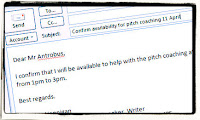Why Relying on LinkedIn Messages Can Be Risky

From time to time I hear about misunderstandings and mishaps caused by poor communication through LinkedIn messages. There might be cases where you turn to this channel because you are trying to reach someone and you don't have their contact information. Or perhaps you are using it because you commonly use LinkedIn messages among friends for routine communication. But for many people this channel doesn't work very well and to rely on it for critical messages can be a risky practice. Your messages might not be seen or they might be seen and then lost. First of all this happens because many LinkedIn users create a profile and update it from time to time but then rarely log in so they don't even see that there are any messages. Some light users might also log in but they are not familiar with the user interface and don't notice the pending messages. Others might see the messages, but visiting rarely they always have to wade through spammy recruitment messages and ...



